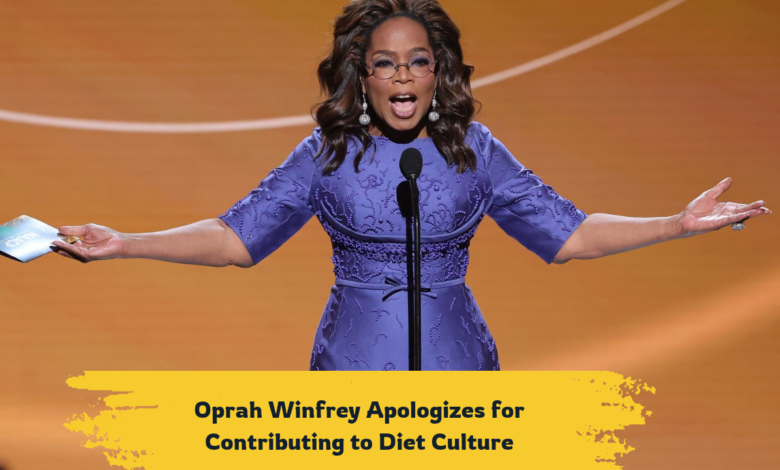Oprah Winfrey Apologizes for Contributing to Diet Culture

Oprah Winfrey, one of the most influential media personalities in history, recently made headlines with a public apology for her role in promoting diet culture. This statement is a significant moment in the ongoing conversation about body image, wellness, and the pervasive impact of diet culture on society. In this article, we will explore the background of Oprah’s influence in this space, the nature of her apology, the reactions it has sparked, and the broader implications for society.
Oprah’s Influence on Diet Cultural
For decades, Oprah Winfrey has been a household name, known for her charismatic presence on television, her ability to connect with audiences on a deeply personal level, and her expansive media empire. Part of her brand has been her openness about her own struggles with weight and body image. Throughout her career, Oprah has often shared her weight loss journeys with her audience, bringing issues of dieting and body image to the forefront of popular culture.
One of the most notable aspects of Oprah’s influence in this arena was her partnership with Weight Watchers (now known as WW). In 2015, she bought a significant stake in the company and became its spokesperson, advocating for the program’s approach to weight loss and healthy living. This partnership further cemented her role as a key figure in the diet industry, with many people turning to her for guidance on their own weight loss journeys.
The Apology: A Turning Point
Oprah’s recent apology for contributing to diet culture marks a significant shift in her public stance. During a segment on NBC’s “Nightly News,” Oprah expressed regret for promoting dieting as a means to achieve societal standards of beauty and worth. She acknowledged that her influence may have perpetuated harmful ideas about body image and contributed to a culture that often equates thinness with success and happiness.
In her apology, Oprah stated that she now understands the detrimental effects that diet culture can have on individuals, particularly women, and that she is committed to promoting a more inclusive and positive message about body image moving forward. This public acknowledgment of her role in perpetuating harmful standards is a powerful moment of reflection and accountability from someone with such significant influence.
Reactions and Responses
Oprah’s apology has garnered a range of reactions from the public and experts alike. Many have praised her for taking responsibility for her role in promoting diet culture and for using her platform to spark a conversation about its harmful effects. Critics of diet culture have welcomed her apology as a step in the right direction, noting that it could help shift the narrative around body image and dieting in a more positive direction.
However, some have expressed skepticism, questioning whether Oprah’s apology is enough to counteract the decades of influence she has had in this space. They argue that while her words are important, there needs to be tangible action to support the change in narrative. This could include using her platform to promote body positivity, diversity in body types, and mental health awareness, rather than focusing solely on weight loss.
Others have pointed out that Oprah’s partnership with WW continues to promote a weight-centric approach to health, which may be at odds with her apology. This tension highlights the complexity of navigating public accountability while maintaining business interests.
The Broader Implications of the Apology
Oprah’s apology is not just a personal admission of guilt; it reflects a broader cultural shift in how we think about body image, health, and wellness. In recent years, there has been growing awareness of the negative impact of diet culture, with movements like body positivity and Health at Every Size (HAES) gaining traction. These movements challenge the traditional notions of beauty and health, advocating for a more inclusive and holistic approach to well-being.
Diet culture has long been criticized for its focus on weight loss as the primary indicator of health and success, often leading to disordered eating, body dissatisfaction, and mental health issues. By apologizing for her role in promoting this culture, Oprah is aligning herself with a growing movement that seeks to dismantle these harmful narratives and promote a more balanced and compassionate approach to health.
The Role of Media in Shaping Diet Culture
Oprah’s apology also shines a light on the powerful role that media plays in shaping public perceptions of body image and health. For decades, media has been a key driver of diet culture, with magazines, television shows, and social media platforms promoting unrealistic body standards and quick-fix diet solutions. Celebrities and influencers, in particular, have a significant impact on these narratives, often setting trends that the public follows.
Oprah’s influence in this space cannot be overstated. As a media mogul with a massive platform, her endorsements and opinions have carried significant weight. Her decision to publicly apologize for her role in promoting diet culture is a reminder of the responsibility that comes with such influence. It also underscores the importance of media literacy and critical thinking when it comes to consuming messages about health and wellness.
Moving Forward: What Does a Positive Narrative Look Like?
In the wake of Oprah’s apology, there is an opportunity to rethink the narratives we promote about health, body image, and well-being. A positive narrative would focus on health as a holistic concept, one that encompasses physical, mental, and emotional well-being, rather than solely on weight loss or appearance.
This approach would prioritize self-care, mental health, and body acceptance, recognizing that health looks different for everyone. It would also promote diversity in body types, challenging the narrow standards of beauty that have long dominated popular culture. Importantly, it would encourage individuals to listen to their bodies and make choices that support their overall well-being, rather than pursuing unattainable ideals.
For Oprah, this could mean using her platform to amplify voices from the body positivity and HAES movements, as well as highlighting stories of individuals who have found health and happiness outside of traditional dieting. It could also involve promoting resources and programs that support mental health, self-acceptance, and a balanced approach to wellness.
The Intersection of Diet Culture and Industry
Oprah’s involvement with WW illustrates the complicated relationship between diet culture and industry. While WW has rebranded itself as a wellness company focused on healthy living rather than just weight loss, it is still fundamentally a business that profits from people’s desire to lose weight. This presents a challenge for Oprah and others who are seeking to distance themselves from diet culture while remaining involved in related industries.
This intersection of diet culture and industry raises important questions about the ethics of promoting weight loss products and programs, especially given the potential harm they can cause. It also highlights the need for transparency and accountability in the wellness industry, as consumers become more aware of the impact that these products and programs can have on their health and well-being.
For those in positions of influence, like Oprah, navigating this landscape requires a careful balancing act. It involves being mindful of the messages being sent, the potential for harm, and the responsibility that comes with having a platform. As more people become aware of the impact of diet culture, there may be increasing pressure on industry leaders to adopt more ethical practices and promote a more balanced approach to health.
Conclusion: A Step Towards Change
Oprah Winfrey’s apology for contributing to diet culture is a significant moment in the ongoing conversation about body image, health, and wellness. It reflects a broader cultural shift towards questioning the harmful narratives that have long dominated our understanding of health and beauty. While her apology is an important step, it also underscores the need for continued action and accountability, both from individuals and from the industries that profit from diet culture.
As we move forward, there is an opportunity to redefine what it means to be healthy, to embrace a more inclusive and compassionate approach to wellness, and to challenge the harmful standards that have caused so much damage. Oprah’s apology is a reminder that change is possible, and that even those with significant influence can choose to use their platform for good.
In this evolving landscape, the conversation about diet culture is far from over. But with voices like Oprah’s leading the way, there is hope that we can move towards a more positive and empowering narrative about health and body image—one that celebrates diversity, promotes well-being, and recognizes that everyone deserves to feel good in their own skin.




